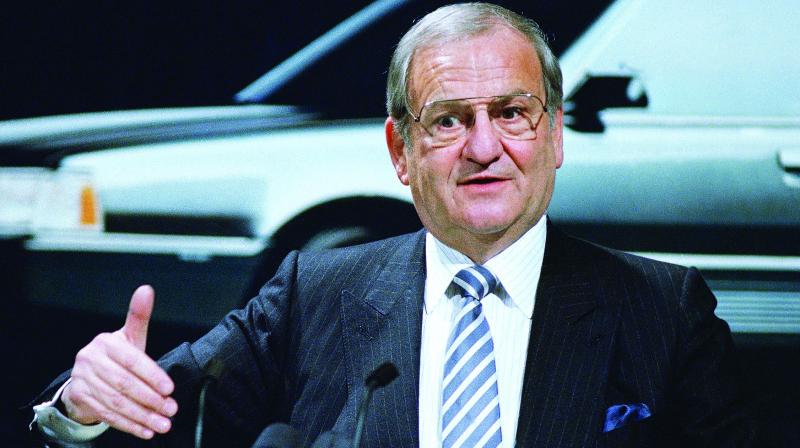Lee Iacocca, who saved Fiat Chrysler fortune, dies at 94
He played a historic role in steering Chrysler through crisis and making it a true competitive force.

Los Angeles: Lee Iacocca, the charismatic US auto industry executive who gave America the Ford Mustang and was celebrated for saving Chrysler from going out of business, has died at the age of 94, Fiat Chrysler said.
Iacocca died on Tuesday at his home in Bel-Air, California of complications from Parkinson's disease, his daughter Lia Iacocca Assad told the Washington Post.
"The company is saddened by the news of Lee Iacocca's passing. He played a historic role in steering Chrysler through crisis and making it a true competitive force," Fiat Chrysler Automobiles said in a statement.
"He was one of the great leaders of our company and the auto industry as a whole. He also played a profound and tireless role on the national stage as a business statesman and philanthropist," the company said.
During a nearly five-decade career in Detroit that began in 1946 at Ford Motor Co, the proud son of Italian immigrants made the covers of Time, Newsweek and the New York Times Sunday Magazine in stories portraying him as the avatar of the American Auto Age. One of the first celebrity US chief executives, his autobiography made best-seller lists in the mid-1980s.
Iacocca was a cracker-jack salesman. He encouraged his design teams to be bold, and they responded with sports cars that appealed to baby boomers in the 1960s, fuel-efficient models when gasoline prices soared in the 1970s, and the first-ever, family-oriented minivan in the 1980s that led its segment in sales for 25 years.
"I don't know an auto executive that I've ever met who has a feel for the American consumer the way he does," late United Auto Workers Union President Douglas Fraser had said. "He's the greatest communicator who's ever come down the pike in the history of the industry."
Iacocca also had some duds, such as the Ford Pinto, an economy car that became notorious for exploding fuel tanks. "You don't win 'em all," he said of the Pinto.
Iacocca won a place in business history when he pulled Chrysler, now part of Fiat Chrysler, from the brink of collapse in 1980, rallying support in US Congress for $1.2 billion in federally guaranteed loans and persuading suppliers, dealers and union workers to make sacrifices. He cut his salary to $1 a year.
Iacocca was often described as a demanding and volatile boss who sometimes clashed with fellow executives.
"He could get mad as hell at you, and once it was done he let it go. He wouldn't stay mad," said Bud Liebler, Vice President of Comm-unications at Chrysler during the 1980s and 1990s.
Six facts about Iacocca
Born Oct. 15, 1924, in Allentown, Pennsylvania, to Italian immigrants, Iacocca went to work for the Ford Motor Co (F.N) as an engineer after finishing college. Not long afterward, he switched to Ford's marketing and sales side.
Iacocca quickly rose through the ranks and was made Ford president in 1964. During his tenure, he championed the highly successful Mustang but clashed with Ford chief Henry Ford II, who fired him in 1978 after 32 years with the company.
He took over struggling Chrysler, now part of Fiat Chrysler Automobiles, a few months later and brought the automaker back from the brink of bankruptcy by going to Washington in 1979 and persuading the federal government to guarantee $1.2 billion in loans to the company. He closed plants and cut the workforce and wages at all levels, including his own salary to $1 a year. When the company rebounded, he made $20 million.
The moves, along with Chrysler's introduction of fuel-efficient cars and the minivan, led to acorporate comeback. He paid off the loans seven years early.
n Chrysler's rebound made Iacocca among the world's best known businessmen. He became a familiar figure through Chrysler TV commercials, telling viewers "If you can find a better car, buy it!" His 1984 autobiography was a long-running best-seller that sold as many as 15,000 copies per day at its peak.
Iacocca considered running for president against George H.W. Bush but changed his mind after conferring with his friend Tip O’Neill, then speaker of the U.S. House of Representatives, who laughed at the prospect and told Iacocca he did not have the temperament for politics.
After stepping down from Chrysler in 1992, Iacocca pursued entrepreneurial ventures including electric bicycles, casinos and a line of imported olive oil products.
— Reuters

